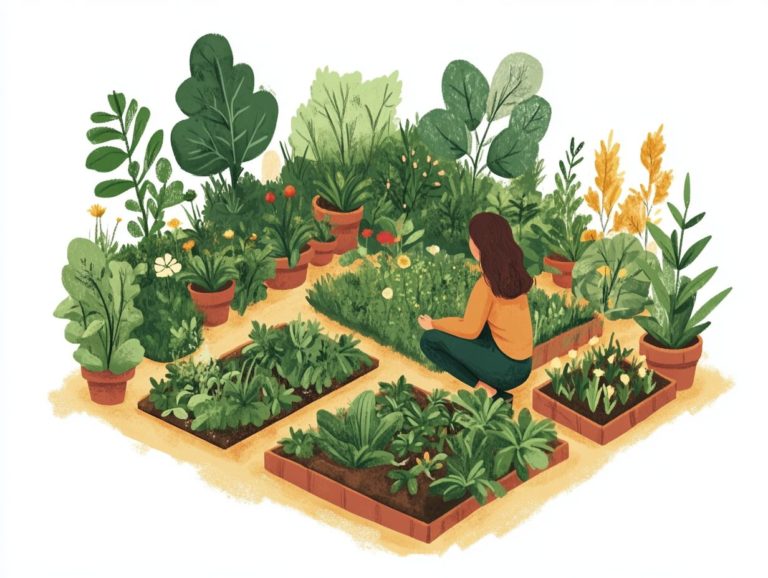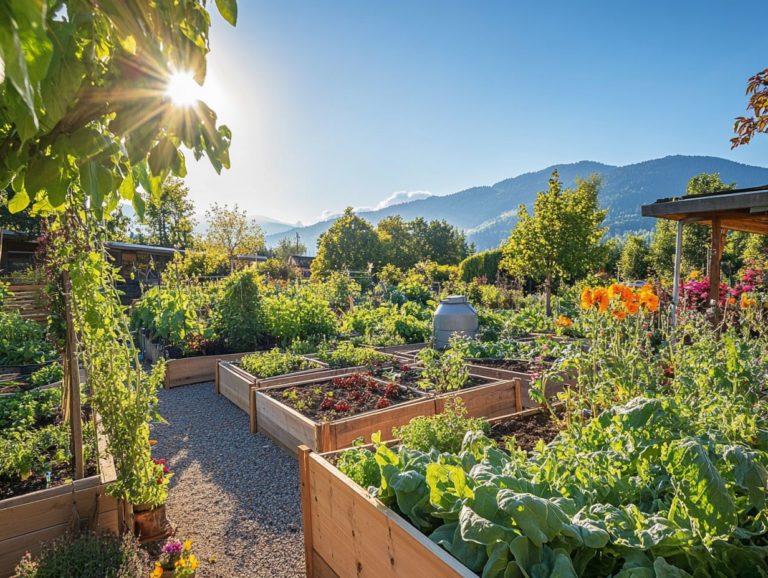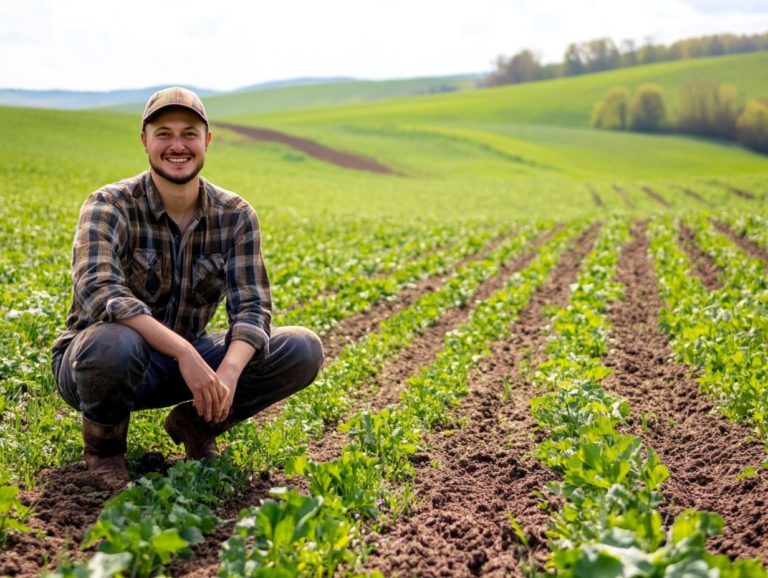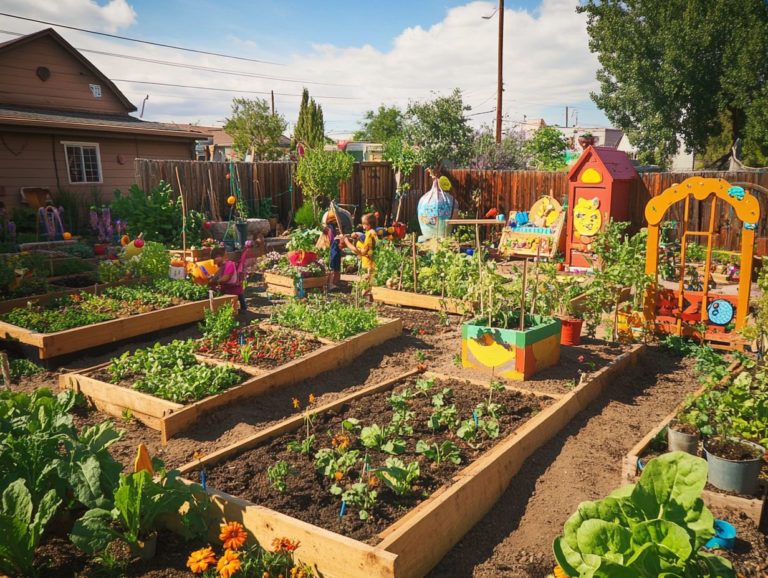How to Connect with Other Permaculture Practitioners?
Permaculture is not just a method of sustainable agriculture; it s a holistic approach that encourages you to live harmoniously with the environment. By understanding its principles, you can empower yourself to create resilient ecosystems and contribute to a healthier planet.
Your journey doesn t have to be solitary! You can connect with other permaculture practitioners to enrich your learning experience and build a supportive community.
Let s explore the exciting benefits of collaborating with fellow permaculture enthusiasts! This article provides insights on how to engage with others and discover growth opportunities through various events and projects.
Discover the vibrant tapestry of connections waiting for you in the world of permaculture.
Contents
- Key Takeaways:
- Understanding Permaculture
- Benefits of Connecting with Other Permaculture Practitioners
- Exciting Ways to Connect with Fellow Permaculture Enthusiasts
- Attending Permaculture Events and Workshops
- Collaborating on Permaculture Projects
- Have Questions About Permaculture? We ve Got Answers!
- What is permaculture?
- Why is it important to connect with other permaculture practitioners?
- How can I find other permaculture practitioners in my area?
- What are some benefits of connecting with other permaculture practitioners?
- Are there any specific ways to connect with other permaculture practitioners online?
- Can I connect with permaculture practitioners outside of my local area?
Key Takeaways:
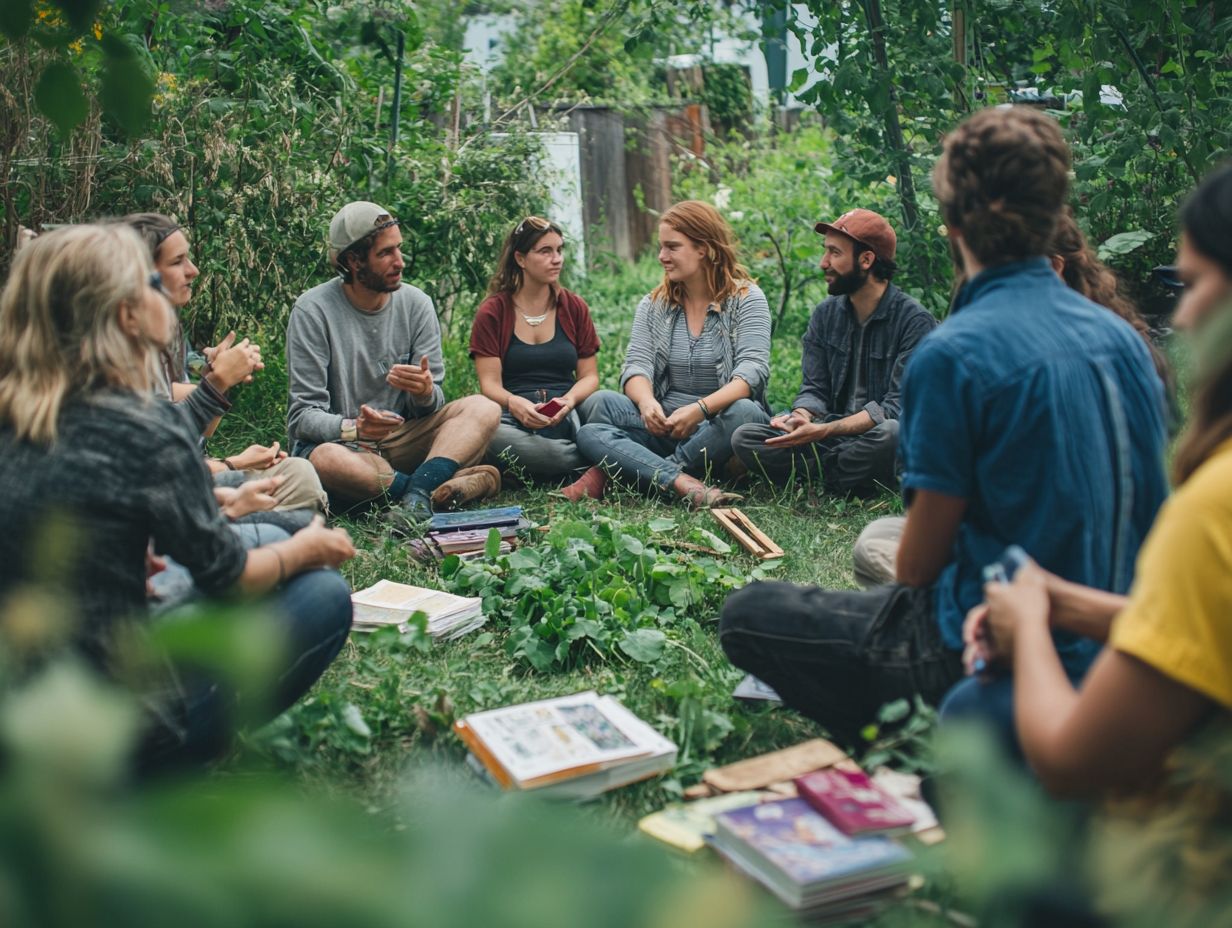
- Building a community and sharing knowledge is essential in permaculture practice.
- Utilizing online platforms and joining local groups are effective ways to connect with other permaculture practitioners.
- Attending events and collaborating on projects provide valuable networking and learning opportunities for a sustainable future.
Understanding Permaculture
Understanding permaculture is crucial for anyone interested in engaging with land in a way that prioritizes socially responsible practices while addressing inequality and injustice.
This holistic approach weaves together permaculture ethics, emphasizing the interconnectedness of ecological systems and the importance of community support, particularly for marginalized groups.
By embracing principles that address privilege and oppression, the permaculture movement aims to cultivate not only the land but also relationships based on social justice and empowerment strategies.
Definition and Principles
Permaculture represents a sophisticated system of agricultural and social design principles that aim to replicate the patterns found in natural ecosystems. This concept is rooted in the pioneering work of visionaries like Bill Mollison and James Lovelock’s Gaia Hypothesis, which suggests that living organisms interact with their inorganic surroundings to form a self-regulating system.
By adopting this innovative approach, you prioritize diversity, resilience, and synergy. Recognizing that nature s intricate relationships can inspire self-sustaining systems lays the foundation for a more harmonious way of living. The design principles of permaculture promote collaboration among various elements, ensuring that each component enhances the overall productivity and health.
As you embrace this holistic view, permaculture integrates ethical considerations such as care for the Earth, care for people, and fair share principles essential to its practice. These core values encourage you to develop ecosystems that not only produce resources but also nurture community, stability, and respect for all living beings.
Benefits of Connecting with Other Permaculture Practitioners
Connecting with other permaculture practitioners offers a wealth of benefits. You’ll enjoy enhanced community support, gain access to invaluable resources, and learn how to foster a culture of permaculture in your community while contributing to grassroots movements that uplift marginalized communities through collaborative learning and shared experiences.
Embracing this network not only enriches your own journey but also empowers those around you in profound ways.
Ready to dive in? Join a local permaculture group or attend an upcoming event to start building your connections!
Community Building and Knowledge Sharing

Community building and knowledge sharing are essential to the permaculture movement. These practices help you communicate effectively and participate in training to fight against unfair treatment in your community.
By embracing strategies like workshops and dynamic discussions, you can explore permaculture principles more deeply. Such initiatives enrich your understanding and create vibrant discussions that lead to better practices in sustainable agriculture.
As you and your community members come together to share insights and experiences, you cultivate a network of support that nurtures resilience and innovation. This interconnectedness strengthens social bonds and amplifies the impact of permaculture, addressing broader environmental and social challenges, ultimately promoting a more just and sustainable future.
Exciting Ways to Connect with Fellow Permaculture Enthusiasts
You have a wealth of opportunities to connect with fellow permaculture practitioners. Consider engaging with local permaculture initiatives, joining local groups, participating in community outreach initiatives, or enrolling in permaculture courses.
These avenues foster collaboration and enrich your knowledge through shared experiences.
Online Platforms and Local Groups
Online platforms and local groups provide essential communication networks for permaculture practitioners. They allow you to nurture grassroots movements and cultivate permaculture education through shared resources and experiences.
Platforms like Facebook groups and specialized forums serve as vital hubs for exchanging knowledge, resources, and success stories, fostering a strong sense of community. Local organizations, such as community gardens or agricultural co-ops, play a crucial role by hosting workshops and events that unite practitioners.
For example, consider the case study of a permaculture network in Oregon, where local meetups sparked the creation of a regional seed-sharing library. This initiative improved teamwork and promoted food sovereignty. By bridging traditional and digital communication methods, you unlock a treasure trove of information that can boost your efforts in sustainable agriculture.
Attending Permaculture Events and Workshops
Attending permaculture events and workshops elevates your knowledge and skills while offering invaluable networking opportunities. You ll engage in collaborative learning and build meaningful connections within the permaculture community, enriching both your experience and practice.
Networking and Learning Opportunities
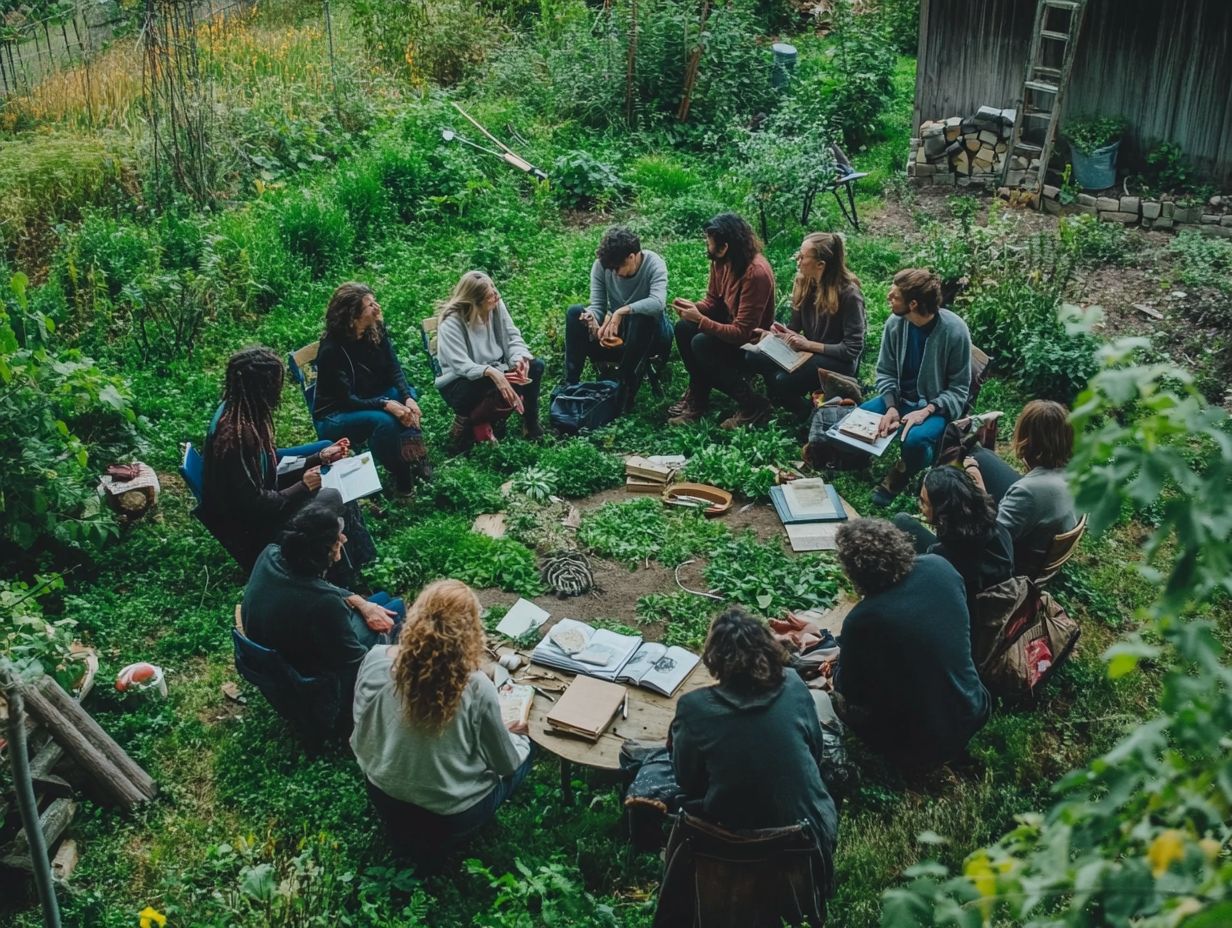
At permaculture events, you’ll discover a wealth of networking and learning opportunities. These feature a diverse array of courses designed to cultivate communication networks and collaborative learning among practitioners, regardless of skill level.
These courses cover a variety of subjects, from the essentials of sustainable agriculture to advanced techniques in land design and ecosystem management. You’ll find workshops that focus on crucial skills like conflict resolution, consensus-building, and effective group facilitation skills essential for any collaborative endeavor.
By immersing yourself in these educational experiences, you can enhance not just your technical expertise but also your interpersonal relationships and networking potential within the community. Participants often walk away with both theoretical insights and practical strategies ready for immediate application, deepening their sense of connection and shared purpose on their permaculture journeys.
Collaborating on Permaculture Projects
Collaborating on permaculture projects offers you a remarkable opportunity to unite efforts for a sustainable future. This approach fosters community activism and employs enablement strategies that uplift both individuals and marginalized communities.
Join the movement today! Get involved in your local community and start making a difference in sustainable agriculture.
Working Together for a Sustainable Future
Working together for a sustainable future means embracing regenerative practices. These practices enhance ecological systems while nurturing community support through inclusive permaculture initiatives.
These initiatives promote biodiversity and help you understand your vital role in local ecosystems. Community gardens, for example, illustrate how neighbors can unite to cultivate organic produce, share knowledge, and forge meaningful relationships.
Urban beekeeping projects further emphasize how collective efforts bolster local pollinator populations. This showcases positive ripple effects on nearby crops. When you look at successful models like transforming vacant lots into thriving green spaces it becomes clear that cooperative action tackles environmental challenges and weaves a stronger social fabric within communities. This leads to healthier and more resilient neighborhoods.
Have Questions About Permaculture? We ve Got Answers!
What is permaculture?
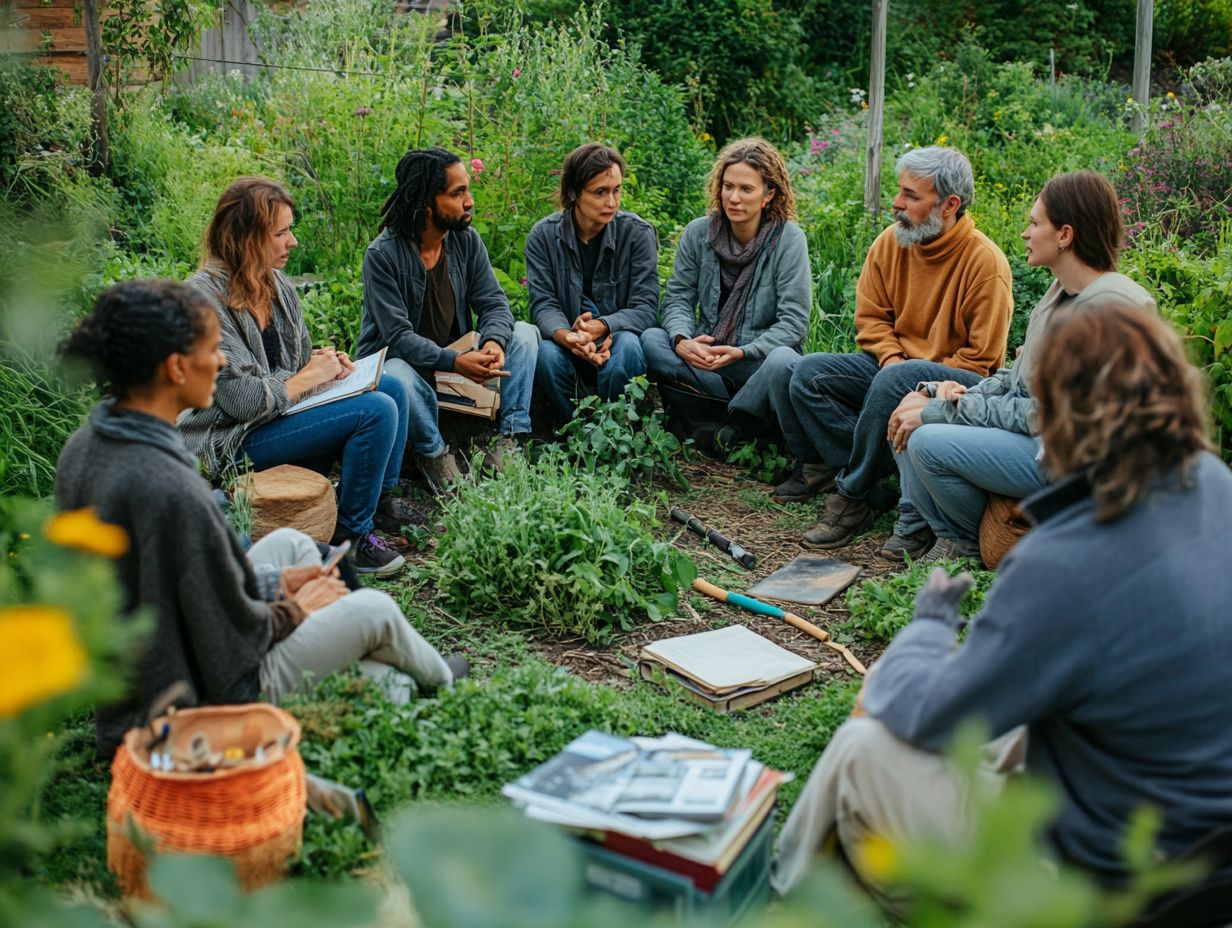
Permaculture designs sustainable systems inspired by nature. It focuses on working with natural patterns to create balance.
Why is it important to connect with other permaculture practitioners?
Connecting with other practitioners enriches your learning and builds community.
How can I find other permaculture practitioners in my area?
To find practitioners nearby, attend local events, workshops, or courses, and engage with gardening groups.
What are some benefits of connecting with other permaculture practitioners?
Connecting with others opens doors for sharing resources and experiences. It creates a supportive network for your permaculture journey.
Are there any specific ways to connect with other permaculture practitioners online?
You can connect online through forums, social media groups, and webinars focused on permaculture.
Can I connect with permaculture practitioners outside of my local area?
Definitely! Online platforms let you connect with practitioners worldwide, enriching your perspective.


